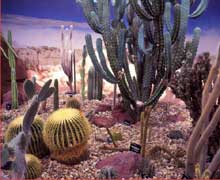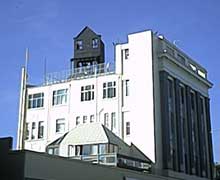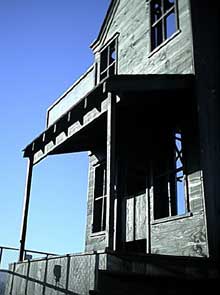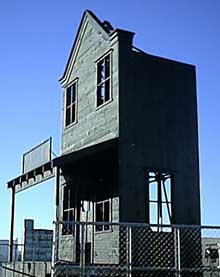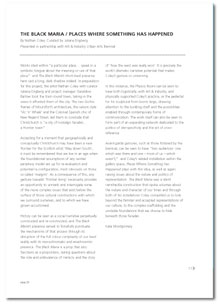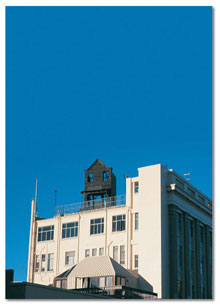 |
|||||||||
|
|
| ...GALLERY EXHIBITS 2002 | ...The Black Maria | ||||||||||||
|
Nathan
Coley (United Kingdom) Like a stage-prop from a silent western Nathan Coley's Black Maria perches on top of the Physics Room. Its unlikely form makes a wonderous addition to the Christchurch skyline, a playfully dark mirror carrying ideas from other places and reflecting the idiosyncratic histories that make up the cityscape. Exploring notions of the frontier, the facade and location, The
Black Maria brings a distinctive icon of the Western to the urban
centre of Christchurch. Scottish artist Nathan Coley will present
The Black Maria as a part of the SCAPE Biennial. Coley's saloon
stage-set is located high on the roof of the Physics Room building
and towers over the intersection of Christchurch's High and Tuam
Streets. It offers a vision of the frontier loaded with theatrical
potential. This new addition to the city skyline brings yet another
facade to a streetscape already loaded with architectural fragments
which evoke a nostalgia for another place. The Coley's project takes both its title and capacity to rotate in pursuit of the sun from the first film studio to be built, Thomas Edison's Black Maria of 1893. In choosing to restage the 'saloon' Coley draws on the nostaglic silent westerns of the 1930's, where the romance and drama of a frontier conquered and now the subject of myth is played out on the screen in flickering black and white. Inside the Physics Room gallery Coley has constructed a second structure and further architectural proposition, a prop for his series of digital prints Places Where Something Has Happened. Nathan Coley is interested in the way the values of a society are
reflected in its built environment. As the stage upon which our
lives unfold how does the architecture we are surrounded by determine
our sense of what is possible? Throughout his practice Coley has
investigated the way that constructed spaces add meaning to our
cultural identity. His work is concerned with revealing the unwritten
codes of convention that surround SCAPE - The Art and Industry Biennial 2002 A Christchurch based festival event located in a range of galleries and public sites, the Art and Industry Biennial has become one of the premier arts events in the year's calendar. Set up to provide a meeting ground between progressive corporations, private and public art institutions, and contemporary and cutting edge visual artists, the Biennial presents the work of national and international artists. The Physics Room played host to a project by Auckland artist Leigh Martin in 2000, and will this year again present a project in conjunction with Art and Industry. The Black Maria @ Art and Industry Reviews, Essays & Articles Climb for visual treat High noon at art saloon Exhibitions
: Christchurch THE BLACK MARIA : Nathan Coley
|
||||||||||||
